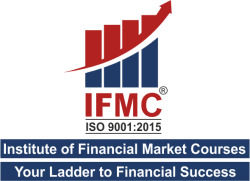
MUTUAL FUND
DISTRIBUTOR V-A
IFMC Institute®
Mutual Fund Distributor VA
Mutual fund industry is growing by and large in India. Now a days AMFI is very active and is educating customers regarding various schemes and risks attached. All those people who wish to be a part of share market but cannot operate in them fully or are a little hesitant, they usually prefer mutual fund.
Knowledge of mutual fund is not only important for those working in financial sector/banks /broking house but is also important for individual investor and trader who wish to invest in mutual funds. NISM Series 5A exam of a mutual fund distributor is becoming important. Through mutual fund course u can choose mutual fund advisor as a career. Mutual Fund Agent Exam consists of 100 questions of 1 mark each and should be completed in 2 hours. Passing score of mutual fund broker exam is 50%.
Unique Feature of Mutual Fund Distributor
- Complete knowledge of various mutual funds.
- You can give exams at NISM SERIES 5A MUTUAL FUND DISTRIBUTOR.
- Know the risk attached to a mutual fund.
- Complete theoretical and practical knowledge of mutual fund.
- Learn from top-notch faculty for over 15 years.
- Based on theory as well as practical for complete knowledge
- You enter the industry completely trained and fit
- Faculty with 15 years of experience in Teaching and trading
- Practice on Live Markets
- Workshops and other programmes and meet with industry experts.
- Become 100% confident to trade and earn
- 5 tier exposure Faculty, Practical Faculty, Older investor and Trader, Research Team, group discussion, RM Reliance Securities
What Will You Get?
- NISM MUTUAL FUND DISTRIBUTOR VA SERIES
- IFMC Certification- MUTUAL FUND DISTRIBUTOR VA SERIES
Certifications
NISM MUTUAL FUND DISTRIBUTOR VA SERIES
- IFMC Certification- MUTUAL FUND DISTRIBUTOR VA SERIES
*NCFM and NISM Certificates are subjected to appearance for the exam at the NSE Center. You get 100% preparation at the branch
- Registration Fees – Rs 1700/-
- Program Fee – Rs 10,000/-
- Program Duration -1 MONTH
Note: Examination fee of NSE & SEBI certification is extra as given
Pay Full or Partial Course Fees
Detailed Curriculum
(Mutual Fund Distributors)
I. Concept and Role of a Mutual Fund
- Concept of a mutual fund
- Functions of a mutual fund
- Advantages and limitations of a mutual fund
- Investment objectives
- Marking to market
- Unit capital
- Assets under management (AUM)
- Fund running expenses
- Net asset value (NAV)
- Brief history of mutual funds in India
- Closed-end funds and open-ended funds
- Categorization of funds by investment objective
- Categorization of funds by investing horizon
- Categorization of funds by asset class
- International funds
- Fund of Funds
II. Fund Structure and Constituents
- Structure of mutual funds in India and related regulations
- Role of the sponsor, trustee and Asset Management Company (AMC) and related regulations
- Role of other fund constituents and related regulations
III. Legal and Regulatory Environment
- Role of regulators in India
- Role and functions of SEBI in regulating mutual funds
- Self regulatory organizations
- Role and functions of AMFI
- AMFI Code of Ethics
- Investment restrictions and related regulations
- Investor rights and obligations
IV. Offer Document
- Regulations with respect to drafting and filing of an Offer Document for NFO
- Process of NFO and steps involved in marketing an NFO
- Objectives of information disclosure in an offer document
- Objectives and contents of the Statement of Additional Information (SAI) and related regulations
- Objectives and contents of the Scheme Information Document (SID) and related regulations
- Key Information Memorandum (KIM) and related regulations
V.Fund Distribution and Sales Practices
- Types of investors and eligibility
- Distribution channels for mutual funds
- Pre-requisites to become a mutual fund distributor
- Key elements of agreement between distributor and a mutual fund
- Sales practices and commission structure
- Types of commissions and transaction charges
- AMFI Code of Conduct
- Process for KYD
VI. Accounting, Valuation and Taxation
- Computation of net assets and NAV
- Announcement of NAV
- Factors affecting the NAV
- Pricing of transactions in a mutual fund
- Time-stamping of transactions
- Charging of expenses
- Key accounting and reporting requirements
- Valuation process carried out by mutual funds
- Applicability of taxes
- Dividend Distribution Tax
- Taxability of dividends and capital gains in the hands of a mutual fund investor
- Applicability of Securities Transactions Tax based on type of transaction and scheme
- Setting off gains and losses under Income Tax Act
VII. Investor Services
- KYC requirements & Demat Account concept
- Process for fresh and additional purchase in a mutual fund
- Additional documentation requirements for institutional investors
- Acceptable payment instruments
- Processes related to redemptions by investors
- Contents and periodicity of Statement of account
- Process for Nomination and Pledge
- Types of Investment options – dividend, growth and dividend re-investment
- Processes related to of systematic investment plans
- Processes related to systematic withdrawals and transfers
- Processes related to other investor services and facilities
VIII. Risk, Return and Performance of Funds
- Return on investment
- Calculation of simple, annualized and compounded returns
- Applicability of returns for different types of funds
- SEBI norms for return representation of mutual funds in India
- Factors that may affect mutual fund performance
- Risks in different type of mutual funds
- Classification of mutual funds based on risk
- Process for Benchmarking of performance
IX. Scheme Selection
- Steps in selecting equity funds
- Steps in selecting debt funds
- Steps in evaluating a money market fund and identifying factors impacting their performance
- Steps in evaluating balanced mutual funds and evaluation of factors impacting their performance
- Sources of data to track mutual fund performance
X. Selecting the Right Investment products for Investors
- Classification of assets into physical and financial assets
- Features of physical assets such as gold and real estate
- Features of financial assets
XI. Helping Investors with Financial Planning
- Basics of financial planning
- Financial goals
- Investment horizon
- Objective of financial planning
- Benefits and need for financial planning to the investor
- Life cycle and wealth cycle in financial planning
- Tools to categorize investors’ needs
XII. Recommending Model Portfolios and Financial Plans
- Risk profiling
- Asset allocation and types
- Importance and steps for developing a model portfolio
Who Should Do This Course?
- MBA & BBA/CA/CS/CPT Students
- Anyone who wants a job in Mutual fund Industry
- Investors and Trader
- RM dealers for their career growth
- All persons working as Mutual Fund Distributor
- Those who want to pursue the career in financial service
Career Opportunity
In Mutual Fund houses as Distributors, banks, Broking Houses, Share Market
Admission Criteria and Eligibility:
- The candidate should Minimum 12th (Senior Secondary) pass from any reorganization Board/institutions. We always recommend the candidate should pass at least bachelor degree so that it will be a bit easier to provide placements. Graduate students get job placement on the direct payroll in big companies, and 12th students will get placement in small companies or in sub-brokers office.
- *placement guarantee refers to (After getting NCFM and NISM Certification of all 10 modules covered in adv. diploma course)
- All original documents-10th,12th graduation, other professional degree certification and mark sheets must be submitted in as a self-attested copy/copies at the branch at the time of admission and originals must be shown to the center In Charge, failing which admission may be cancelled
- 95%attendence is must during the programme in each module opted by the student.
- Remarks /Recommendation of faculty and center Head will be taken in the record after each class
- Your certification depends on your Attendance, class assessment, projects, internal exams, NSE exams, Practical classes, Projects and Viva.
- The decision of Center in Charge center Head will be final.














